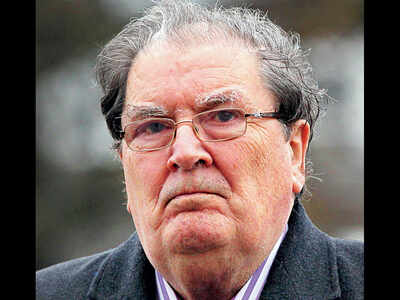
LONDON: John Hume, the Roman Catholic architect of Northern Ireland’s 1998 Good Friday peace agreement who won the Nobel Peace Prize for his role in ending 30 years of sectarian violence, died on Monday at the age of 83.
World leaders and former leaders praised him as a “political titan”, visionary and hero for the Irish people.
A veteran civil rights campaigner credited with kick-starting peace negotiations in a British region convulsed by bloodshed in the early 1990s, Hume shared the Peace Prize with Northern Ireland’s then-first minister, David Trimble of the Protestant Ulster Unionist Party.
He died in a care home in his native Londonderry in the early hours of Monday, his family said in a statement.
“John Hume was a political titan; a visionary who refused to believe the future had to be the same as the past. His contribution to peace in Northern Ireland was epic,” former British prime minister Tony Blair, in office at the time of the Good Friday accord, said in a statement.
Former US President Bill Clinton, who described Hume as a friend, praised him for “marching on against all odds towards a brighter future for all the children of Northern Ireland.”
British Prime Minister Boris Johnson called Hume a “political giant” and Irish Prime Minister Micheál Martin said he was a “great hero” for the Irish people.
Hume in 1968 joined a movement to protect the civil rights of the province’s pro-Irish Catholic minority, fighting against discrimination by the pro-British Protestant majority in everything from housing to education.
As leader of the moderate Social Democratic and Labour Party (SDLP), Hume was an important advocate of non-violence as fighting erupted between Irish nationalists who wanted a united Ireland and pro-British forces, including the British Army, who wanted to maintain the region’s British status.
By 1998, over 3,600 had been killed.
World leaders and former leaders praised him as a “political titan”, visionary and hero for the Irish people.
A veteran civil rights campaigner credited with kick-starting peace negotiations in a British region convulsed by bloodshed in the early 1990s, Hume shared the Peace Prize with Northern Ireland’s then-first minister, David Trimble of the Protestant Ulster Unionist Party.
He died in a care home in his native Londonderry in the early hours of Monday, his family said in a statement.
“John Hume was a political titan; a visionary who refused to believe the future had to be the same as the past. His contribution to peace in Northern Ireland was epic,” former British prime minister Tony Blair, in office at the time of the Good Friday accord, said in a statement.
Former US President Bill Clinton, who described Hume as a friend, praised him for “marching on against all odds towards a brighter future for all the children of Northern Ireland.”
British Prime Minister Boris Johnson called Hume a “political giant” and Irish Prime Minister Micheál Martin said he was a “great hero” for the Irish people.
Hume in 1968 joined a movement to protect the civil rights of the province’s pro-Irish Catholic minority, fighting against discrimination by the pro-British Protestant majority in everything from housing to education.
As leader of the moderate Social Democratic and Labour Party (SDLP), Hume was an important advocate of non-violence as fighting erupted between Irish nationalists who wanted a united Ireland and pro-British forces, including the British Army, who wanted to maintain the region’s British status.
By 1998, over 3,600 had been killed.
Download
The Times of India News App for Latest World News

Coronavirus outbreak
Trending Topics
LATEST VIDEOS
More from TOI
Navbharat Times
Featured Today in Travel
Get the app









